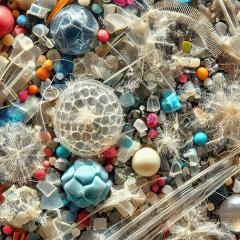How degradable are biodegradable plastics? The effect of toxic compounds on the biodegradability of bioplastics
There is tremendous excitement for bioplastics, which are generally considered to be environmentally benign. But bioplastics, like their fossil-derived counterparts, can sorb organic pollutants from the environment which are mostly toxic. Furthermore, almost in all cases, bioplastic products comprise of a biopolymer matrix with solid filler/s and/or additives. The additives added could sometimes be toxic. But the question now is: just how biodegradable are biopolymers with the presence of these toxic compounds? This presentation captures a preliminary study on the effect of the presence of carefully selected toxic compounds on the biodegradability of a prototype bioplastic, polyhydroxyalkanoate (PHA). A representative toxic persistent organic pollutant in the environment, phenanthrene (PHEN), and a common additive used in plastic processing as a plasticizer, dibutyl phthalate (DBP), were chosen. The PHA samples (with and without toxins) in slab form were embedded in active soil according to ISO 17556 using WTW OxiTop® Biological Oxygen Demand testing apparatus, which enable the continuous monitoring of O2 consumption as an indication of biodegradation. The samples have been buried in soil for 6 months. Preliminary results showed that the presence of PHEN and DBP lengthened the lag time/inhibition time before biodegradation of the substrate took place. However, the presence of PHEN did not interfere with the biodegradation rate of PHA and in fact, led to a slightly higher biodegradation rate. The DBP (20 wt%) plasticized PHA degraded faster than that without, most probably due to both the plasticising effect which lowered the crystallinity of the PHA and the leaching of the blended DBP which created porosity in the bulk matrix. Mechanisms of the change of microbial community were proposed to explain the observation. Future work lies on verifying the hypothesized mechanisms through microbial community analysis alongside with a more thorough experimental matrix.
Clement Chan is a postdoctoral research fellow at the School of Chemical Engineering, the University of Queensland, Australia, where he obtained his PhD in 2019 with a focus on biocomposites. He is one of the key researchers in the Translational Polymer Research Group. His major research experience stretches across the full spectrum in biocomposites materials development, from manufacturing, in-service performance to end-of-life analysis. Currently, his research focus is on understanding the biodegradation and toxicological impacts of bioplastics and biocomposites in the environment. The outcomes of these research activities aim to address the global challenge of minimising waste, which generates benefits broadly to the community as part of a move towards a ‘zero waste’ and sustainable future.

